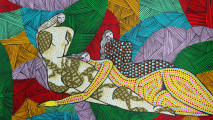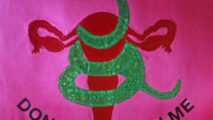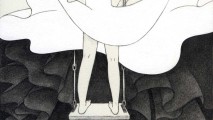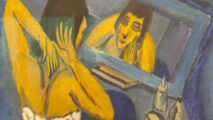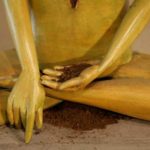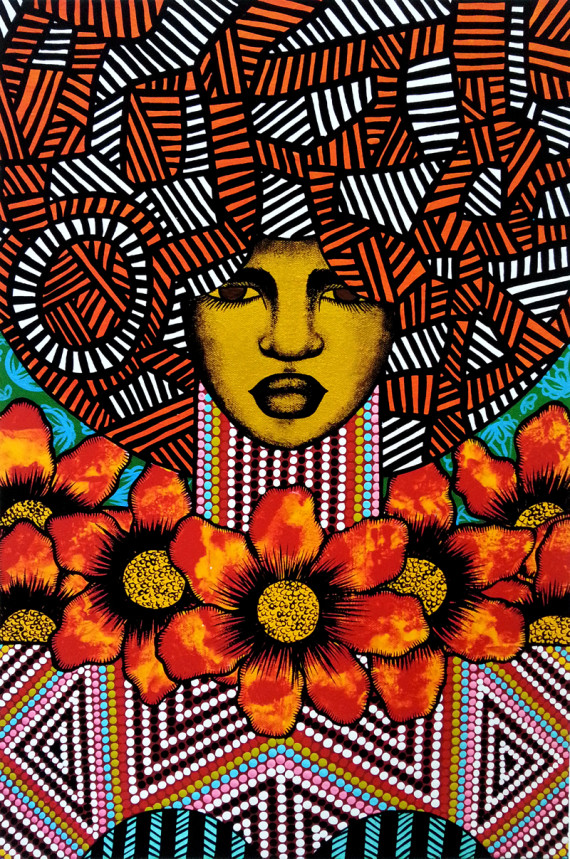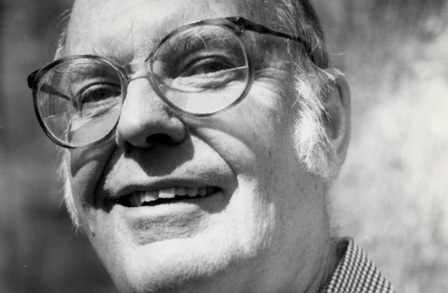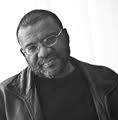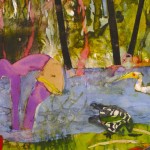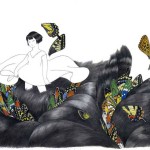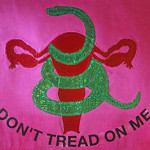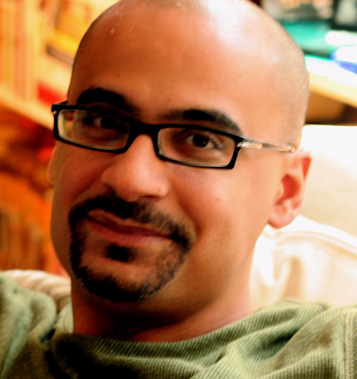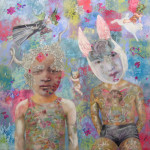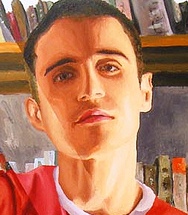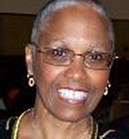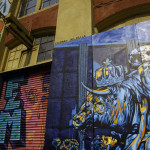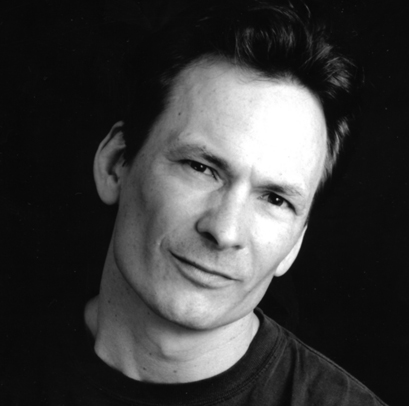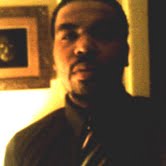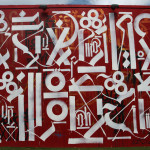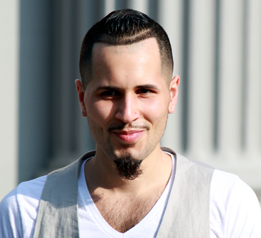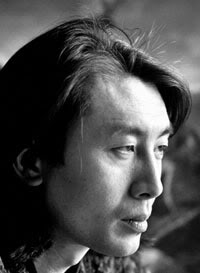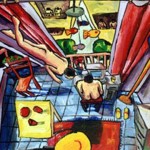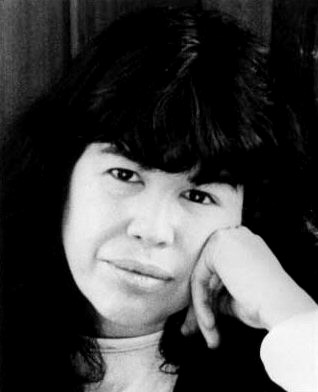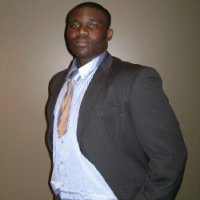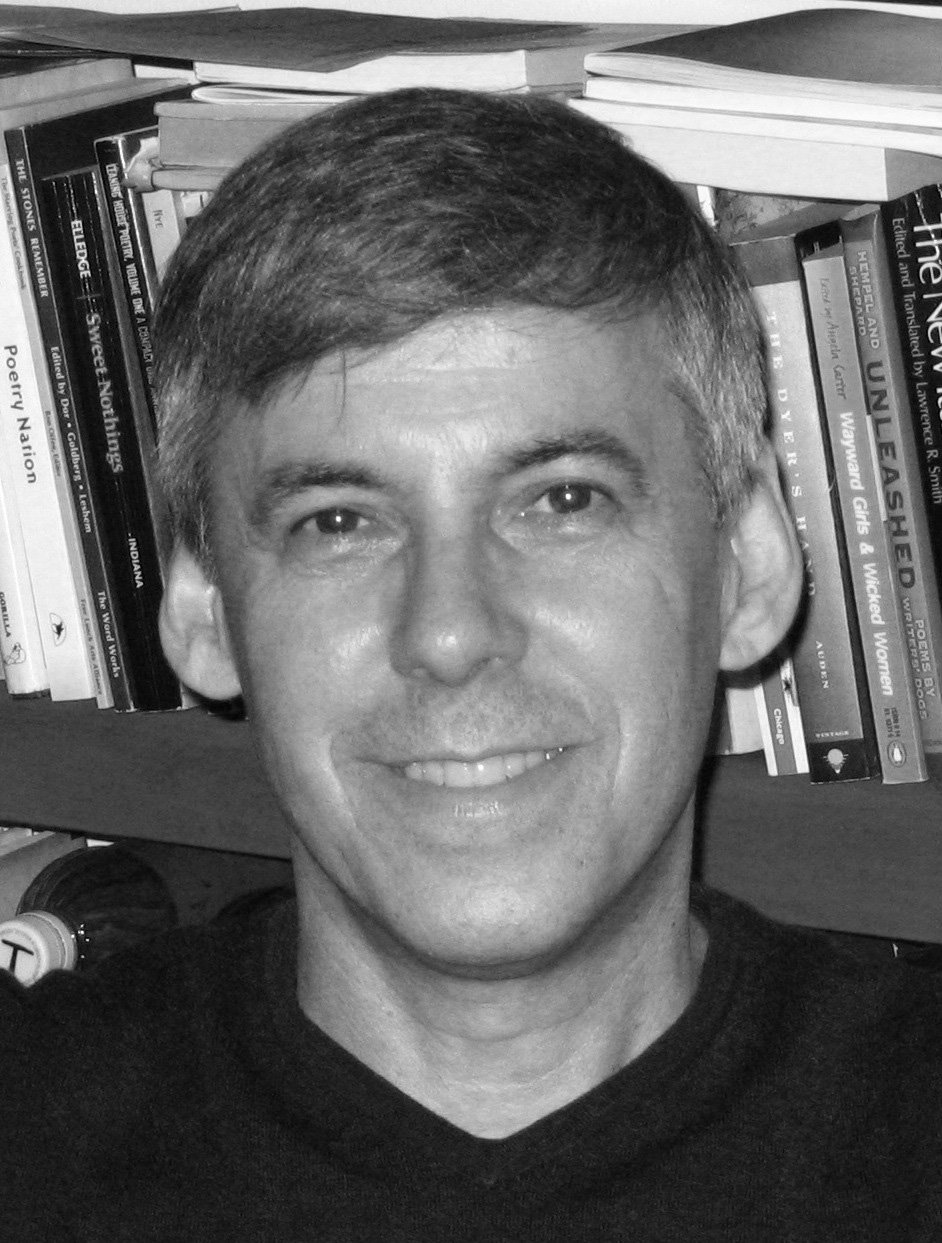You are becoming more and more comfortable with the routine of your therapy sessions. The office with the white walls, chipped paint, some outdated magazines. On the wall across from your seat there’s a generic-looking landscape painting. You sit on the chair, legs crossed, flipping mindlessly through a National Geographic from 2001. The white noise machine in the waiting room masks the conversation in your therapist’s office, droning on eternally.
When the patient before you leaves through the other exit, the one in the office, so that nobody will see her, your therapist pokes his head out through door of the waiting room, and you follow him into his office, plopping yourself down on the couch, no need to be asked.
You don’t even really believe in therapy, but the other shoe has got to drop eventually, right? Somehow, some way? You’ve already tried everything else. You’ve tried yoga and meditation. You quit smoking, drinking, and eating meat, all in the same week, which might have backfired, but still. You’ve tried quitting social media and ditching your smartphone. You’ve tried cutting off all your hair (“but make it look feminine!” you told the hairdresser, and she knew what you meant). You’ve tried sleeping with strangers. You’ve tried sleeping with no one at all. You’ve experimented with sleeping on the floor after reading a blog about “minimalism as a lifestyle.” But none of it has worked, and now you’re here, and even though you’re not entirely sure what you’re doing here, in this tiny office with that dreadful waiting room outside, you come every Tuesday and you continue to get nowhere. And so you’re not even making an effort anymore really. Instead, you’re sitting there, and you’re saying:
“I’m a gay man.”
And your therapist—Dr. Friedberg—says, “
Let’s talk about that, Emily.”
You don’t know what happened, and that’s the problem. This idea, that if you just flap your jaws enough, that eventually you’ll be “cured”—who came up with this idea? Because a cure does not seem at all imminent, as far as you can tell. Instead you sit there, and you either make jokes or you speak earnestly, except that when you speak earnestly, by the time you’re through, it feels like you’re talking about someone else, someone not in the room. The feelings that you describe are not your feelings, and then your therapist will say something about “progress,” and you will leave, confused.
And so now you’re saying:
“What’s to talk about? I’m reading Leo Bersani and I’ve practically had my head shaved. There’s no way I’m not a gay man.”
What you want to do, what you’ve tried to do, is to say that you’re just going through a bad breakup. Last year, you met someone, and the sex was good, even if the conversation was dull, and you got along well enough, and eventually you moved in together. Then in April he splits, says something about going to the Alaskan wilderness.
And now your therapist, a strained smile on his face, is saying:
“Emily, I can only help you to the extent that you let me help you. If joking around like this makes you feel better, then that’s fine, but if we’re going to make any real progress…”
The problem with pinning this state of yours, this stale un-feeling, on the breakup, is that in truth it wasn’t the breakup that depressed you. When he left, you were relieved. Your small one-bedroom was a claustrophobic nightmare with him around, and a small tinge of despair hit you every time you found a pair of dirty briefs on the floor, or every time he left the toothpaste uncapped. Seven-hundred-fifty square feet had never felt so spacious as when he finally left and you were sitting on your couch, almost reveling in the quiet of his absence.
But if not the break-up, then what? The other day you spent an hour looking out the window of your apartment, your eyes glazing over as the traffic crept by. Maybe you’ll start jogging, you think.
****
So you go to work at your job at the call center. You will be fired soon—most employees, you learned soon after they hired you, are fired in the first two weeks, but that’s okay. You never were looking for a “career” anyhow, just a way to make money until you figure out whether or not you want to go to graduate school. Your quota for the end of the first two weeks is five sales. You have made zero.
The first fifty calls either go straight to voicemail or hang-up on you while you’re delivering the monologue you’re supposed to read off the screen of your computer. You sigh, slip off your headphones. You listen to the buzz of the call center. Dozens of people failing to execute dozens of monologues. You pop an Advil. Slip the headphones back on. Call number fifty one picks up.
“Hi, this is Emily, calling from… Are you happy with your air conditioning? … Low prices, quick installation….”
The man on the other end of the line has a thick Indian accent. Your computer screen says he is from Amarillo, Texas. That makes sense, you guess. It’s hot in Texas.
“Um,” he says.
You say: “…85 percent customer satisfaction rating… Your money back guaranteed.”
“85 percent,” he echoes. “That’s pretty good.”
The Advil has not yet kicked in and the dull ache in your temple is making it very difficult to sell air conditioners with the kind of conviction a good air conditioner saleswoman ought to have. It will kick in soon, but not right now, and meanwhile the customer has, as your supervisor says, “gone off script.” You do not know what to say, so you say:
“Yes. It’s pretty good.”
The man on the other end of the line says nothing, but you know he has not hung up on you yet because you can hear him breathing.
So you say: “Are you interested in purchasing an air conditioner today?”
“Um,” he says. “I don’t know. I have an air conditioner.”
“But ours is better,” you say, dubious.
“Hm,” he says. “Maybe. Do you recommend it?”
And now it is your turn to say, “Um. I guess.”
“You guess?”
“Yeah.”
“That’s it?”
And suddenly you have to choke back this urge you woke up with this morning, the inexplicable urge to cry. Today is not the only time you’ve woken up with this feeling, that you might start crying immediately upon waking and perhaps never stop, but usually it goes away with the morning coffee. But today it lingers, and in your emotional state, you are finding it difficult to sell this Indian man from Amarillo an air conditioner. So you almost manically start reading off your script again:
“…two-way air direction system distributes your air coolly and evenly…”
You read the sales pitch as though you were delivering bad news to a stranger: delicately, uncertainly. You want to want to Believe in Your Product, you want to want to be a Good Salesperson, but you can muster neither a coherent strategy nor any of the professional pep you really need.
“Huh,” he says. “Hm. I guess… I guess I’ll buy it.”
But he, also, lacks a certain pleasure that people who buy things are supposed to have. He doesn’t really seem to want this air conditioner at all, and the idea that somebody would buy an air conditioner over the phone when he already has one that works perfectly well, and when it isn’t at all clear that he really even wants to buy it—it’s all enough to bring a certain moisture to your eyes.
And so you tell this man the only thing you can tell him: “You don’t have to buy it if you don’t want to. You don’t seem to want it, or need it, really.”
And again the sound of his heavy breath takes place of a reply for a while, before he says, “What?”
“I’m just saying,” you say.
“I’m confused,” he says.
And so, with a sigh, you say: “Me too, man.”
And then you hang up on him, and slip the headphones off again, and close your eyes for a minute, trying to will the Advil to finally start working against your migraine. When you open them, you feel your supervisor standing behind you and he’s saying:
“Emily.”
And you turn around to look at him, your eyes still a little wet, even though the tears haven’t yet fallen. You wish these crying-ish spells would stop. But right now you are on the verge of tears, and you are looking at your supervisor, Ben, who never really seemed to like you in the first place and certainly isn’t shy about that right now.
And you say: “Oh. Hi.”
****
Back in the therapist’s office, again. He sits back in his chair, legs folded, hands clasped on his lap. Where does this go? What’s the point? You think of the things you could buy with the $100 a week you’re paying Dr. Friedberg.
You say, “So I got fired.”
He says, “Hm. Tell me about that.”
So you tell him about the Indian guy, how he didn’t want the air conditioner, but was willing to buy one anyway, and how inexplicably sad it made you, and you say, “I felt like I was, I don’t know, saving him, or something. But afterwards, when I turned and saw that my supervisor had been listening in on it the whole time, I just felt stupid.”
Dr. Friedberg says, “Hm.”
And you shrug and say, “Yeah.”
A moment passes and, because you are the type of person who isn’t comfortable with silence, you say, “I feel like crying all the time.”
“Because of your job?”
“No. Just because.”
He frowns and says, “I can recommend a good psychiatrist.”
You sigh and say, “I don’t want pills.”
****
So at the end of another impossibly long week, you drag yourself—more out of habit than desire—to the comedy house to watch the Open Mic Night. One evening several years back, you were walking home, slightly drunk, after a lousy date, and you wandered in here, hoping to be cheered up. And you were cheered up, though not in the way you’d expected. The jokes the comics told weren’t very good, and you didn’t laugh all that much, and there weren’t that many people in the crowd that night. But what made you feel better that night was a certain energy behind it all: here were a group of people who were trying, in earnest, to do something with themselves. To make something original, and worthwhile, and maybe even meaningful. Many of them were failing to do so, of course, but, as you came back, week after week, you noticed that so too did the failing comics come back, fine-tuning their jokes, making another sincere go of it.
Yes, there was magic here, in the beginning. Or, you thought, if there was going to be magic anywhere, it might as well be here. There was something incredibly moving and promising in these people, something you had not found anywhere else. So you kept coming back. Some of the comics got better, most did not, and the latter, by and large, started to come less and less, until they disappeared entirely from the scene, and faded from your memory, like a pop song you once knew by heart but had since forgotten. A few of them went on to have careers, and you would watch their HBO specials and feel happy for them when you did. And those who burned out were replaced by strange new faces, also filled with promise, and when you went, you would see how much this mattered to them, you would see how badly they wanted to make you laugh, and how comedy might be a stab at the kind of unique connection that great literature used to facilitate. And sitting there, you used to smile.
Lately though, not so much. You come because you have been coming for years, and there isn’t anything else to do anyway. You don’t have very many friends, and the ones you do have you prefer to see only occasionally. So, even though this place has long since failed to bring a smile to your lips, here you are, and you sit down and you see your waiter, Jim, who you’ve known since he started working here a couple of years ago. Jim is a tall man, a few years younger than yourself, with nice, short, black hair and very light emerald eyes, and when you first met him you thought he was flirting with you, and you planned pretty quickly on sleeping with him, but nothing ever came of it. In retrospect, he was probably just being a good waiter. But he’s still friendly, and he’s become something of a fixture in your Friday nights here, and so when you sit down at the table, there he is, with that smile.
“Hi,” he says.
“Hey Jim,” you say, sounding more tired than you wanted to.
“How’s it going?” he asks.
“You know. Same old. I got fired the other day. But you don’t want to hear about that. I’m sorry.”
“Oh shit,” he says. “No, I’m sorry.”
You purse your lips in lieu of having anything else to say, and he stands there, still smiling. Jim was always smiling when he worked. Sometimes you want to say to him, can you cut that out? People who smile all the time make me lonely. But you never do.
“So, can I get you anything?” he asks.
“A beer?” you ask, uncertain.
“I thought you quit drinking,” he says.
“Well, you know…”
Jim raises his eyebrows, up and down, real quick. And he says, “What kind of beer you want?”
And you say, “Surprise me.”
Jim comes back a couple of minutes later with a glass of Budweiser.
“It’s hard to surprise people,” he says as he sets it down. “We only serve Bud and Corona.”
You shrug and say, “Budweiser is fine.”
He smiles, still, and he says, “Let me know if you need anything.”
You thank him and watch him walk briskly away, to attend to other customers. The Open Mic Night hasn’t started yet.
There are regulars, others like you, but for the most part, you don’t know them. Almost all come with friends or family, except you and this one other guy, a bit older than yourself, Fred or Frank or what’s his name. He tried to hit on you one night about a year back, came up to you a bit drunk, spouted a garbage pickup line, and you made it apparent that you weren’t interested. He hasn’t spoken to you since. There’s a couple whom you’ve never spoken to, beautiful and youngish and well-to-do-looking. You’ve never spoken to them but you’ve imagined lives for them. They’ve been married for about a year, and he’s a lawyer and she teaches mathematics at a community college. They don’t have any kids yet, but things are looking good and they’re trying to start trying soon. There’s another couple, septuagenarians, who are quite friendly and who talk to you all the time before and after shows. Larry and Linda. You just now realize that they’re among the select group of people—inside the comedy club or not—that you genuinely enjoy talking to. You’re not sure how to feel about this.
The host takes the stage and welcomes everybody to Open Mic Night. The club hires somebody to host it each week, and you’ve seen this particular guy a few times. It’s the host’s job to introduce each comic before he or she comes on stage, and this host likes to make fun of the comics who have an especially hard time of it, and you, in turn, have grown to kind of loathe him. But anyway, he only says a few words before the show starts, and you sit back, you sip your beer, already slightly buzzed since your tolerance has gone entirely away after you quit drinking.
The first couple of acts are okay. It’s an election year, so there’s a lot of political humor, which is not your personal favorite, but the crowd seems to be enjoying it, and nobody is bombing. In between the second and third act, while the host is in the middle of a lame one-liner, Linda finally sees you and gives you a smile and a wave. You nod your head, and suddenly it almost feels good to be here again, and to be a regular. Almost.
And then the third act comes on, and you know more or less on sight that it’s not going to go well. He’s a kid, for one, no older than twenty-two, and kids, generally speaking, come to Open Mic Nights to fuck up. It’s a rite of passage for comics, bombing is, and if the act in question is worth his salt, he’ll keep coming back. It’s true that you don’t come here for the talent, you come here for a certain spirit, a certain sense of resilience and almost stupid optimism that you haven’t found anywhere else, but still, when a comic bombs—especially a young comic, like this, for whom it’s probably his first time—your heart breaks, just a tiny bit.
The kid on stage is as pale as a slice of white cheddar, almost moon-skinned. His face is acne-scarred and he wears those tragically un-hip round glasses, like the kind your father wears. He’s got on a Misfits t-shirt and a pair of black jeans, and he holds the microphone as though it were a delicate explosive. Your heart sinks before he’s even said a word.
And then it starts.
“Hey everyone,” he says, in the squeaky, off-kilter voice that belongs almost exclusively to the adolescent and the fatally nervous, “I’m Michael. How are you guys doing tonight?”
The crowd gives him a lifeless hoot, and he nods.
“Very nice. Very nice.”
It’s silent for a moment and, as you finish what’s left of your beer, you quickly signal Jim to bring you another round. You’re hoping that this kid will surprise, or that he’ll at least do alright, but right now you can see his knees wobble from your seat, and you’re not at all confident he’s going to do well.
“Lots of couples out in the audience,” he says, with a smile so forced that it can barely be called a smile. “Lots of couples. Look at these guys,” he says, gesturing to a fairly non-descript couple seated up front, who both look about your age, maybe a little older. He’s wearing a green sweater and she’s wearing a baggy skirt, and they both seem happy enough. “You guys married?”
You hear the echo of the “yes” that the woman gives Michael.
“How long have you been married?”
Murmur.
“Three years! Right on, right on.”
There’s another pause, and you can feel the crowd start to get slightly restless. Usually, people understand it’s an Open Mic Night, and that their expectations should be managed accordingly, but every once in a while, the crowd doesn’t get the memo, or has a bit too much to drink, or simply won’t pay attention to the act, electing to talk amongst themselves over the various jokes.
“I just got out of a relationship myself,” he says.
You don’t like where this is headed. Not at all.
“We met in college. Junior year. And there’s nothing like your junior year of college, you know? You’re not an underclassman anymore, you’re all settled in, you’re not stressed out about managing your time or whatever. But so I met her at this party, and, long story short, we wind up dating for like a year. And you know, I’m me,” he says, gesturing towards his body with his free hand, waiting for a laugh that doesn’t come, “and she is just—she’s fucking incredible. She’s like one of those girls who all the other girls hate, you know? Because she doesn’t have to make much of an effort to be as good-looking as she is. Just like no makeup, she likes a ponytail, you get the idea. And this whole time, I’m worried—I mean, like, cosmically worried, just anxious with every fiber of my being—that she somehow missed something, and doesn’t realize how much better she could do. And like, sure, everything is great now, I mean, are you kidding me? But there’s a clock ticking in my head the whole time, counting down to the day when she wakes up, looks over at me, and she’s just like what the fuck, you know?”
At this point, you’re slightly less nervous for Michael than you had been when you first saw him. Nothing he’s said is funny, and he’s still very awkward and obviously uncomfortable, which probably explains the audience’s discomfort that you sense, but he tells his story with the cadence of a joke, which is sometimes enough. Maybe he won’t bomb after all, you think. You take a deep breath and listen to him go on.
“But okay, so everything’s going great, otherwise. So summer of that year she says, ‘we should get an apartment together, move off campus.’ And the voice in my head is telling me, like really screaming at me: No, don’t do this, you fat, ugly fuck, don’t do it, she’s gonna leave you and then you’re gonna be homeless, don’t do it don’t do it.’ But I’m also falling in love with her, and you know, of course I’m going to move in with her. There’s no real reason not to. So I move in the start of the next semester—”
And suddenly, here it comes: some guy, middle aged, a few days’ beard growth, baseball cap, sitting alone in the back corner of the club, is cupping his hands around his mouth and shouting, “Tell us a fucking joke!” Like anything else, it only takes one before all the others turn, and you want to turn to the guy and tell him to shut up, but you don’t. You sip your beer and hope it passes.
Michael, interrupted, pauses briefly, winces just ever so visibly, and ignores the comment, pressing on.
“I move in, and right away, you can just tell something is weird. Like, you know that feeling when you’ve been living with someone for a while, and you’ve just woken up—it’s like six in the morning—and you stumble, you know, like a drunk or something into the kitchen, searching for coffee or whatever it is, and you open your stupid eyes and there she is? And you just get irrationally angry, like, how could she do this to me? How could she exist?”
There are few things worse to feel than the full-body cringe you get when somebody tries to make a joke that falls flat. The middle-aged guy in the corner boos again, and Michael’s voice begins to shake a little more with each passing phrase.
“But yeah, so there’s that, and then also there’s still all the stuff with her being out of my league or whatever. But you know, I still do love her, at the end of the day, and nothing is obviously wrong, so some months go by and I think maybe some of the weirdness is going away but who knows. And then, I come home one day from a night class that let out early. And I see somebody’s car parked in the parking lot of our building, in my spot, and I know right away, well, that’s it. But, like, in a really fucked up way I’m also kind of excited about it, you know? Because I get to be the guy now! I get to be the guy who’s like, ah I’ve caught you! You’re a bad person! J’accuse! Which is way better than her sitting me down and, you know, oh honey, I love you, but there’s someone else.”
The middle-aged guy has shut up, at least for the time being, but Michael still hasn’t gotten a single laugh. Still, it doesn’t appear as though he’ll be booed off stage or anything, and ultimately, it could be going worse.
Why are you so invested in this guy? What is your motivation here? It’s not even like you’re rooting for him to succeed; you just want desperately for him not to fail. You’re praying for mediocrity, basically. And where’s the magic in that? That isn’t what keeps you coming back here. You start to feel depressed and you take a generous sip from your pint glass.
“So I walk up the steps to our apartment—and it’s a sixth floor walk-up, so there’s a lot of steps—and I’m just huffing and puffing, and I’m thinking about what I’m going to say. Like, I’m already at that point visualizing what I could say to her, and I want it to be something that’s just soul-crushing, you know? Something that just eats her heart up and makes her want to, like, evaporate out of shame. So finally, I get up to my apartment, and I’m out of breath, but I’m too caught up in everything to care, and I jam my key into the lock, and I fling open the door and I’m practically running to our room—I can hear them, and they clearly haven’t heard me come in—and I barge in and I open my mouth to say something but—”
There’s a pause here. You think, this might be good storytelling but it’s not comedy. You think, this pause is too dramatic. You think, poor kid. You think, if the magic has gone from this place, I’m not sure where the hell else to look for it. You think, oh fuck.
Because now something has happened to the kid’s face. The emotion, that kind of jokey energy he had before, has simply left his being, sizzled up like water in a frying pan, and he’s now somehow even paler than before, and you can tell he’s committing the cardinal sin of comedy, as far as your lay-knowledge of comedy is concerned; he’s lost control.
“And I see them,” he says in a suddenly quiet, distant voice, affect flat as a pancake, “and she’s startled, her eyes are bulging and she’s covering her tits… whatever. And then I see him. And he is hideous. He’s got this bowl cut, a soul patch, and a lazy eye, and a scar running down the side of his left cheek. He’s a little bit overweight and, I’ve never had high self-esteem, but I think, I’m better looking than this guy.”
The room is just dead silent, and you’re not sure whether or not that’s a whole lot better than being booed. You’ve literally never heard it this quiet in this room before. And something else you’ve never seen before: the kid on the stage, who just a second ago was frowning at something on the floor, is now crying. Balling. And in between sobs, he’s saying:
“This whole time I was worried… This whole time I was worried that… Oh god… Oh shit.”
****
And then a week later, you find yourself once again in your therapist’s office. You sit there not knowing what to say, and he is looking at you both patiently and expectantly, the way people sometimes look children whose babble they’ve decided to indulge. You are in no hurry for a conversation to get underway. You look to your left, at his wall, on which hang a host of certificates and diplomas, all hanging inside nice, neat little frames.
And then you realize that you’re paying by the hour, and you say,
“I decided to quit quitting drinking.”
He raises an eyebrow. “Oh?”
“Yeah.”
“How come?”
And you say, “I thought if I made all these drastic changes in my life, something would give. This—I don’t know—this quagmire or whatever that I seem to be trapped in… I thought maybe if I just started changing a lot of different things about my life, the way I feel about my life would change. But it hasn’t. So I drank.”
He asks, “What kind of change did you envision?”
You open your mouth to say something, but find that there are no words. You sigh, and your eyes turn back to the Wall of Diplomas. And you’re saying,
“You don’t look that old.”
He smiles a little, cocks his head to the side.
“What?”
“You have all those diplomas on the wall, but you don’t even look old enough to have been in school for that long.”
At which he shrugs. “You didn’t answer my question.”
And so you say, “I don’t know.”
“Sure you do.”
“No I don’t. I wish I did. I want to know what to want. But I don’t. So I can’t even begin to answer that question.”
There’s another silence, and you’re thinking that this whole thing is just a complete waste of time and money. Maybe your problem is that—for whatever reason—you want to feel miserable. Why else work at a call center with a college degree? Why else date someone for the better part of a year, despite never having loved him? Why else drag yourself, every week, to a comedy club that you no longer take any joy in?
And then you’re saying:
“Sometimes the world feels as though it has the rhythm of a joke, but then the punchline never comes.”
And he looks at you, giggles quietly, and says, “You know, people go to therapy for that.”
Corey Isaacs is a writer from Palisades, New York, just over the state line from Bergen County. He is currently an MFA candidate at George Mason University.
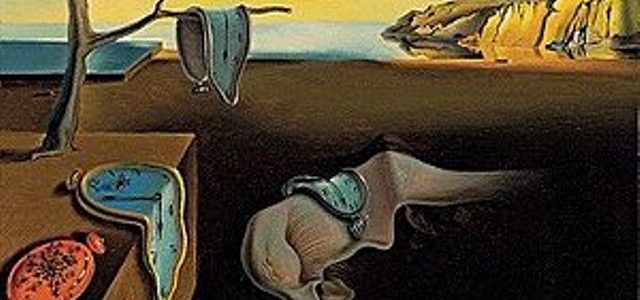
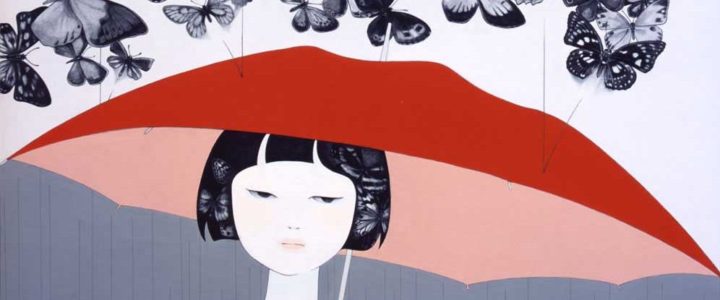
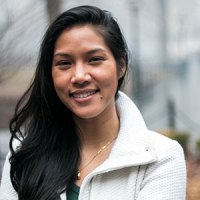 Monica Sok is a 2016-2018 Stadler Fellow at Bucknell University. She has received honors from the National Endowment for the Arts, Kundiman, the MacDowell Colony, Saltonstall Foundation, Hedgebrook, the Elizabeth George Foundation, the Jerome Foundation, and elsewhere. Her chapbook Year Zero was selected by Marilyn Chin for a Poetry Society of America Chapbook Fellowship. Her poems appear or are forthcoming in the Kenyon Review, Virginia Quarterly Review, Narrative, and the New Republic, among others. She holds an MFA in Creative Writing from New York University. She is from Lancaster, Pennsylvania.
Monica Sok is a 2016-2018 Stadler Fellow at Bucknell University. She has received honors from the National Endowment for the Arts, Kundiman, the MacDowell Colony, Saltonstall Foundation, Hedgebrook, the Elizabeth George Foundation, the Jerome Foundation, and elsewhere. Her chapbook Year Zero was selected by Marilyn Chin for a Poetry Society of America Chapbook Fellowship. Her poems appear or are forthcoming in the Kenyon Review, Virginia Quarterly Review, Narrative, and the New Republic, among others. She holds an MFA in Creative Writing from New York University. She is from Lancaster, Pennsylvania.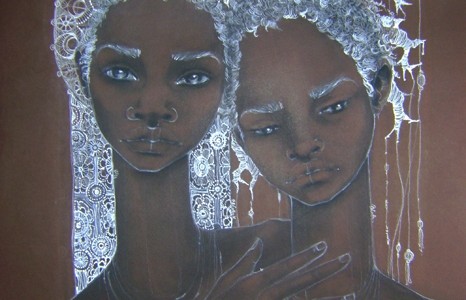
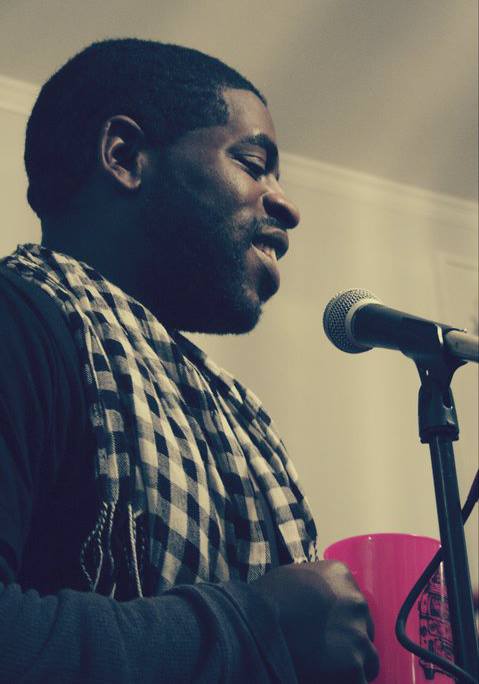 Hanif Willis-Abdurraqib is a poet, essayist, and cultural critic from Columbus, Ohio. His poetry has been published in Muzzle, Vinyl, PEN American, and various other journals. His essays and music criticism has been published in The FADER, Pitchfork, and The New York Times. He has been nominated for the pushcart prize, and his poem “Hestia” won the 2014 Capital University poetry prize. His first full length collection, The Crown Ain’t Worth Much, is forthcoming in 2016 from Button Poetry / Exploding Pinecone Press. He is a Callaloo Creative Writing Fellow, an interviewer at Union Station Magazine, and a poetry editor at Muzzle Magazine. He is a member of the poetry collective Echo Hotel with poet/essayist Eve Ewing. Additionally, he is a columnist at MTV News, where he writes about music, and fights to get Room Raiders back on the air. He thinks poems can change the world, but really wants to talk to you about music, sports, and sneakers.
Hanif Willis-Abdurraqib is a poet, essayist, and cultural critic from Columbus, Ohio. His poetry has been published in Muzzle, Vinyl, PEN American, and various other journals. His essays and music criticism has been published in The FADER, Pitchfork, and The New York Times. He has been nominated for the pushcart prize, and his poem “Hestia” won the 2014 Capital University poetry prize. His first full length collection, The Crown Ain’t Worth Much, is forthcoming in 2016 from Button Poetry / Exploding Pinecone Press. He is a Callaloo Creative Writing Fellow, an interviewer at Union Station Magazine, and a poetry editor at Muzzle Magazine. He is a member of the poetry collective Echo Hotel with poet/essayist Eve Ewing. Additionally, he is a columnist at MTV News, where he writes about music, and fights to get Room Raiders back on the air. He thinks poems can change the world, but really wants to talk to you about music, sports, and sneakers.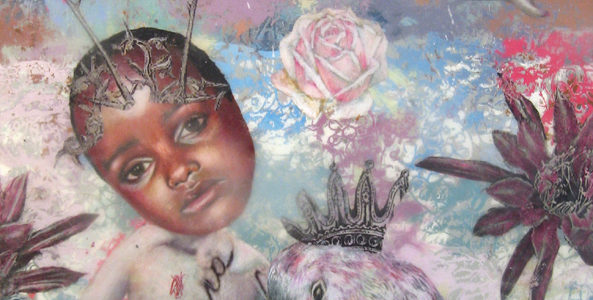
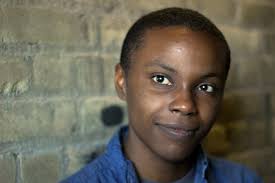 Cameron Awkward-Rich is the author of the chapbook Transit (Button Poetry, 2015) and his debut collection, Sympathetic Little Monster,was published by Ricochet Editions in 2016. He is a Cave Canem Fellow, a poetry editor at Muzzle Magazine, and currently a doctoral candidate in Modern Thought & Literature at Stanford University.
Cameron Awkward-Rich is the author of the chapbook Transit (Button Poetry, 2015) and his debut collection, Sympathetic Little Monster,was published by Ricochet Editions in 2016. He is a Cave Canem Fellow, a poetry editor at Muzzle Magazine, and currently a doctoral candidate in Modern Thought & Literature at Stanford University.
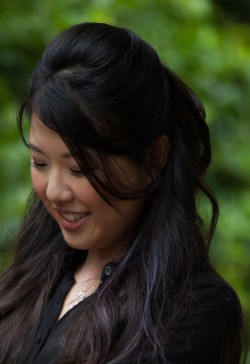 Marci Calabretta Cancio-Bello is the author of Hour of the Ox, which won the 2015 AWP Donald Hall Prize for Poetry (Pittsburgh, 2016), and has received poetry fellowships from Kundiman and the Knight Foundation, among others. Her work has appeared or is forthcoming in The Adroit Journal, Best New Poets 2015, Columbia: A Journal of Literature & Art, december magazine, Los Angeles Review of Books Quarterly, Narrative Magazine, and more. She serves as cofounding editor for Print-Oriented Bastards and producer for The Working Poet Radio Show. www.marcicalabretta.com.
Marci Calabretta Cancio-Bello is the author of Hour of the Ox, which won the 2015 AWP Donald Hall Prize for Poetry (Pittsburgh, 2016), and has received poetry fellowships from Kundiman and the Knight Foundation, among others. Her work has appeared or is forthcoming in The Adroit Journal, Best New Poets 2015, Columbia: A Journal of Literature & Art, december magazine, Los Angeles Review of Books Quarterly, Narrative Magazine, and more. She serves as cofounding editor for Print-Oriented Bastards and producer for The Working Poet Radio Show. www.marcicalabretta.com.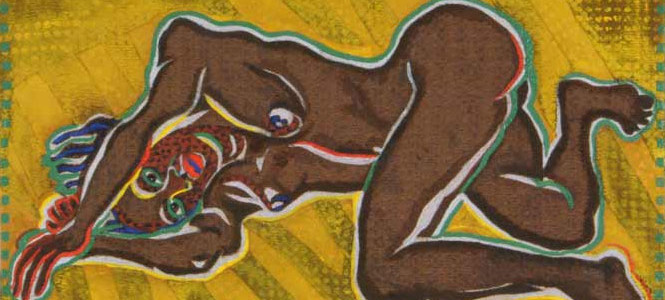
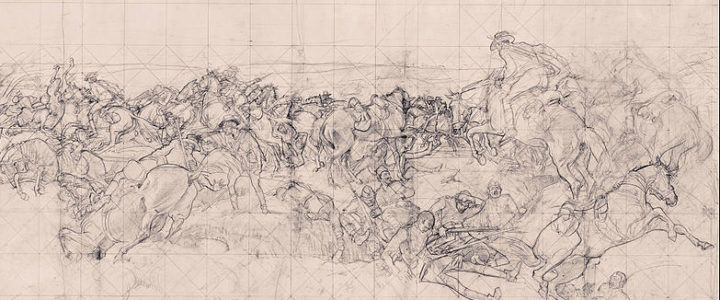
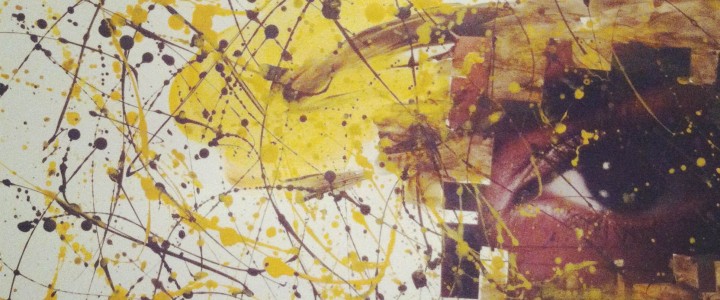
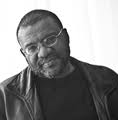 Kwame Dawes is the author of twenty books of poetry and numerous other books of fiction, criticism, and essays. He has edited over a dozen anthologies. His most recent collection, City of Bones: A Testament (Northwestern University Press) will appear in 2016 along with Speak from Here to There, a co-written collection of verse with Australian poet John Kinsella, and A Bloom of Stones, a tri-lingual anthology of Haitian Poetry written after the earthquake, which he edited. A Spanish-language collection of his poems, titled Vuelo, will appear in Mexico in 2016. He is Glenna Luschei Editor of Prairie Schooner and teaches at the University of Nebraska and the Pacific MFA Program. He is Director of the African Poetry Book Fund and Artistic Director of the Calabash International Literary Festival.
Kwame Dawes is the author of twenty books of poetry and numerous other books of fiction, criticism, and essays. He has edited over a dozen anthologies. His most recent collection, City of Bones: A Testament (Northwestern University Press) will appear in 2016 along with Speak from Here to There, a co-written collection of verse with Australian poet John Kinsella, and A Bloom of Stones, a tri-lingual anthology of Haitian Poetry written after the earthquake, which he edited. A Spanish-language collection of his poems, titled Vuelo, will appear in Mexico in 2016. He is Glenna Luschei Editor of Prairie Schooner and teaches at the University of Nebraska and the Pacific MFA Program. He is Director of the African Poetry Book Fund and Artistic Director of the Calabash International Literary Festival.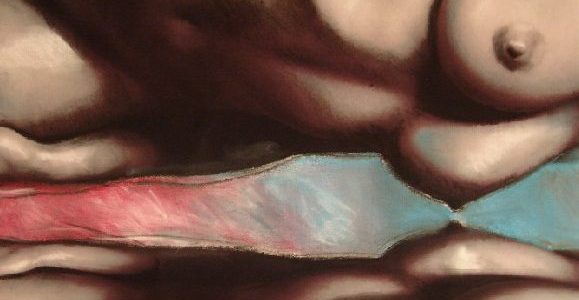
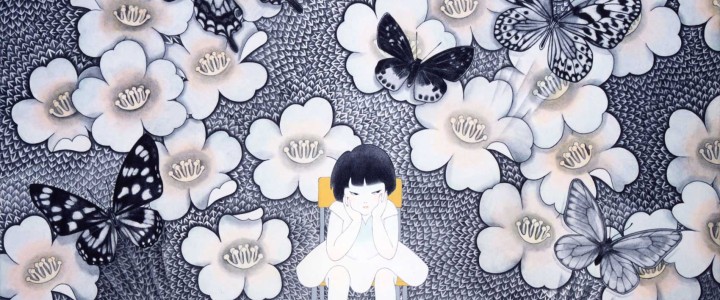
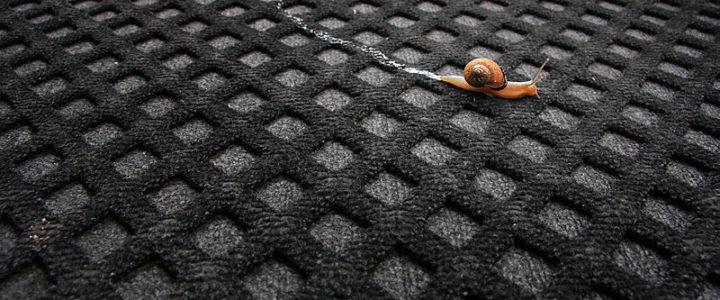
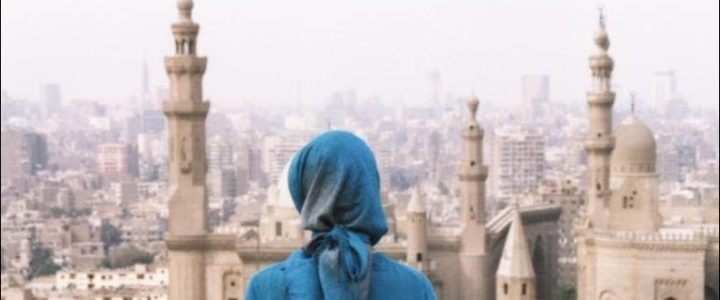
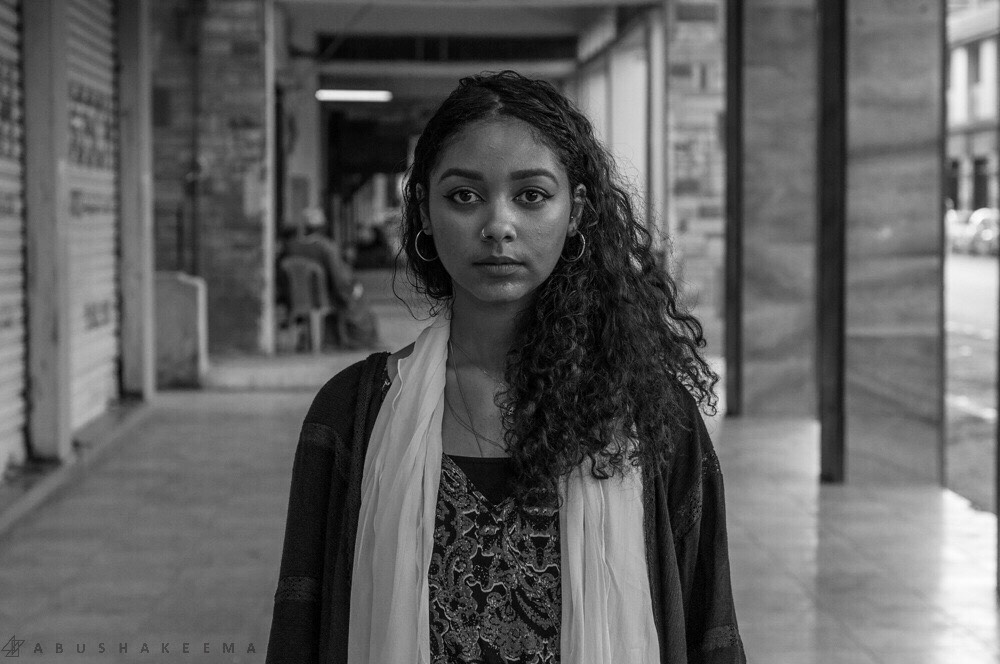 Safia Elhillo’s first full-length collection, The January Children, is forthcoming from University of Nebraska Press in 2017. Sudanese by way of Washington, DC, a Cave Canem fellow and poetry editor at Kinfolks Quarterly: a journal of black expression, she received an MFA in poetry at the New School. Safia is a Pushcart Prize nominee, co-winner of the 2015 Brunel University African Poetry Prize, and winner of the 2016 Sillerman First Book Prize for African Poets. In addition to appearing in several journals and anthologies including The BreakBeat Poets: New American Poetry in the Age of Hip-Hop, her work has been translated into Arabic and Greek.
Safia Elhillo’s first full-length collection, The January Children, is forthcoming from University of Nebraska Press in 2017. Sudanese by way of Washington, DC, a Cave Canem fellow and poetry editor at Kinfolks Quarterly: a journal of black expression, she received an MFA in poetry at the New School. Safia is a Pushcart Prize nominee, co-winner of the 2015 Brunel University African Poetry Prize, and winner of the 2016 Sillerman First Book Prize for African Poets. In addition to appearing in several journals and anthologies including The BreakBeat Poets: New American Poetry in the Age of Hip-Hop, her work has been translated into Arabic and Greek.
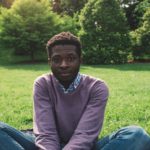 Emmanuel Oppong-Yeboah is a Ghanaian American poet living out the diaspora in Boston (Massachusetts). He is both Black & alive. Emmanuel is the reviews editor for Winter Tangerine and an associate editor for Maps for Teeth. He enjoys hot carbs, brightly colored chapbooks, and the long sigh at the end of a good book.
Emmanuel Oppong-Yeboah is a Ghanaian American poet living out the diaspora in Boston (Massachusetts). He is both Black & alive. Emmanuel is the reviews editor for Winter Tangerine and an associate editor for Maps for Teeth. He enjoys hot carbs, brightly colored chapbooks, and the long sigh at the end of a good book. 